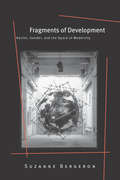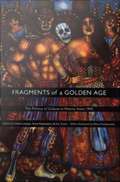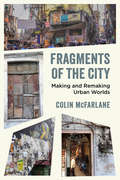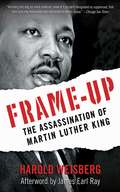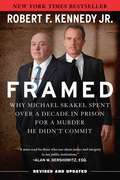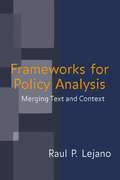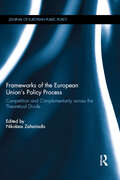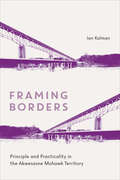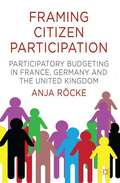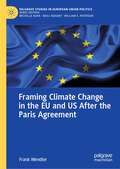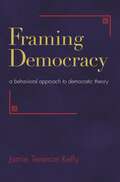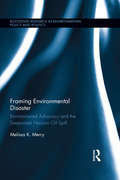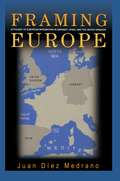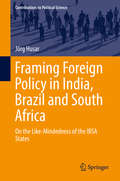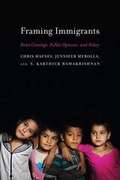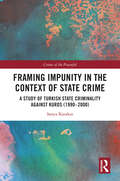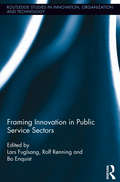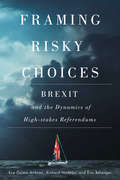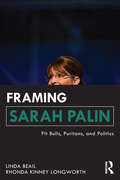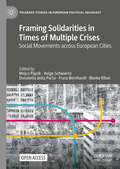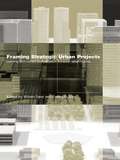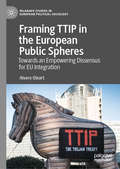- Table View
- List View
Fragments of Development: Nation, Gender, and The Space of Modernity
by Suzanne Bergeron"A bold and challenging consideration of questions of development, economic globalization, communities and subjectivity from a unique feminist perspective. A must-read book for those who wish to understand restructuring and resistance in this era of intensified globalization. " ---Isabella C. Bakker, York University "Bergeron's pathbreaking analysis challenges orthodox development theories, questions current feminist economic thinking and highlights crucial new gendered challenges to globalization. " ---Jane Parpart, Dalhousie University "Cutting-edge scholarship. Bergeron deftly engages the complexity of current debates while retaining clarity, improving analyses, and illuminating alternatives. " ---V. S. Peterson, University of Arizona By tracing out the intersection between the imagined space of the national economy and the gendered construction of "expert" knowledge in development thought, Suzanne Bergeron provides a provocative analysis of development discourse and practice. By elaborating a framework of including/excluding economic subjects and activities in development economics, she provides a rich account of the role that economists have played in framing the contested political and cultural space of development. Bergeron's account of the construction of the national economy as an object of development policy follows its shifting meanings through modernization and growth models, dependency theory, structural adjustment, and contemporary debates about globalization and highlights how intersections of nation and economy are based on gendered and colonial scripts. The author's analysis of development debates effectively demonstrates that critics of development who ignore economists' nation stories may actually bolster the formation they are attempting to subvert. Fragments of Developmentis essential reading for those interested in development studies, feminist economics, international political economy, and globalization studies.
Fragments of a Golden Age: The Politics of Culture in Mexico Since 1940
by Gilbert M. Joseph Anne Rubenstein Eric ZolovDuring the twentieth century the Mexican government invested in the creation and promotion of a national culture more aggressively than any other state in the western hemisphere. Fragments of a Golden Age provides a comprehensive cultural history of the vibrant Mexico that emerged after 1940. Agreeing that the politics of culture and its production, dissemination, and reception constitute one of the keys to understanding this period of Mexican history, the volume's contributors--historians, popular writers, anthropologists, artists, and cultural critics--weigh in on a wealth of topics from music, tourism, television, and sports to theatre, unions, art, and magazines. Each essay in its own way addresses the fragmentation of a cultural consensus that prevailed during the "golden age" of post-revolutionary prosperity, a time when the state was still successfully bolstering its power with narratives of modernization and shared community. Combining detailed case studies--both urban and rural--with larger discussions of political, economic, and cultural phenomena, the contributors take on such topics as the golden age of Mexican cinema, the death of Pedro Infante as a political spectacle, the 1951 "caravan of hunger," professional wrestling, rock music, and soap operas. Fragments of a Golden Age will fill a particular gap for students of modern Mexico, Latin American studies, cultural studies, political economy, and twentieth century history, as well as to others concerned with rethinking the cultural dimensions of nationalism, imperialism, and modernization. Contributors. Steven J. Bachelor, Quetzil E. Castaeda, Seth Fein, Alison Greene, Omar Hernndez, Jis & Trino, Gilbert M. Joseph, Heather Levi, Rubn Martnez, Emile McAnany, John Mraz, Jeffrey M. Pilcher, Elena Poniatowska, Anne Rubenstein, Alex Saragoza, Arthur Schmidt, Mary Kay Vaughan, Eric Zolov
Fragments of the City: Making and Remaking Urban Worlds
by Colin McFarlaneCities are becoming increasingly fragmented materially, socially, and spatially. From broken toilets and everyday things, to art and forms of writing, fragments are signatures of urban worlds and provocations for change. In Fragments of the City, Colin McFarlane examines such fragments, what they are and how they come to matter in the experience, politics, and expression of cities. How does the city appear when we look at it through its fragments? For those living on the economic margins, the city is often experienced as a set of fragments. Much of what low-income residents deal with on a daily basis is fragments of stuff, made and remade with and through urban density, social infrastructure, and political practice. In this book, McFarlane explores infrastructure in Mumbai, Kampala, and Cape Town; artistic montages in Los Angeles and Dakar; refugee struggles in Berlin; and the repurposing of fragments in Hong Kong and New York. Fragments surface as material things, as forms of knowledge, as writing strategies. They are used in efforts to politicize the city and in urban writing to capture life and change in the world's major cities. Fragments of the City surveys the role of fragments in how urban worlds are understood, revealed, written, and changed.
Frame-Up: The Assassination of Martin Luther King
by James Earl Ray Harold WeisbergBack in print with its original title, Harold Weisberg's detailed and devastating analysis of the Martin Luther King assassination is as timely as ever. Originally published in 1970, this book examines the circumstances of the murder, accused assassin James Earl Ray's flight and capture, and the failures of the justice system in this case.While many books about the King assassination have followed Frame-Up, this work remains unrivaled in its retelling of the circumstances which led Ray to plead guilty in a grossly inadequate "mini trial," and Ray's almost immediate failed attempt to retract this confession.Weisberg also dissects the evidence in the case, and concludes that while Ray was a part of the conspiracy, he did not shoot Dr. King, serving as another "patsy" in the troubling assassinations of the 1960s.
Framed: Why Michael Skakel Spent Over a Decade in Prison for a Murder He Didn't Commit
by Robert F. Kennedy Jr.On Halloween, 1975, fifteen-year-old Martha Moxley’s body was found brutally murdered outside her home in swanky Greenwich, Connecticut. Twenty-seven years after her death, the State of Connecticut spent some $25 million to convict her friend and neighbor, Michael Skakel, of the murder. The trial ignited a media firestorm that transfixed the nation. Now Skakel’s cousin Robert F. Kennedy, Jr., solves the baffling whodunit and clears Michael Skakel’s name. In this revised edition, which includes developments following the Connecticut Supreme Court decision, Kennedy chronicles how Skakel was railroaded amidst a media frenzy and a colorful cast of characters—from a crooked cop and a narcissistic defense attorney to a parade of perjuring witnesses.
Frames of War: When Is Life Grievable? (Radical Thinkers)
by Judith ButlerIn Frames of War, Judith Butler explores the media's portrayal of state violence, a process integral to the way in which the West wages modern war. This portrayal has saturated our understanding of human life, and has led to the exploitation and abandonment of whole peoples, who are cast as existential threats rather than as living populations in need of protection. These people are framed as already lost, to imprisonment, unemployment and starvation, and can easily be dismissed. In the twisted logic that rationalizes their deaths, the loss of such populations is deemed necessary to protect the lives of 'the living.' This disparity, Butler argues, has profound implications for why and when we feel horror, outrage, guilt, loss and righteous indifference, both in the context of war and, increasingly, everyday life.This book discerns the resistance to the frames of war in the context of the images from Abu Ghraib, the poetry from Guantanamo, recent European policy on immigration and Islam, and debates on normativity and non-violence. In this urgent response to ever more dominant methods of coercion, violence and racism, Butler calls for a re-conceptualization of the Left, one that brokers cultural difference and cultivates resistance to the illegitimate and arbitrary effects of state violence and its vicissitudes.
Frameworks for Policy Analysis: Merging Text and Context
by Raul LejanoFrameworks for Policy Analysis argues that, in order to bring relevance back to policy analysis, we need to approach policy situations as complex phenomena and employ multiple ways of looking at things in order to understand the essential elements of each policy case. The book is an exploration of distinct, sometimes radically different, models for analysis, but it is also a reference for these multiple methodologies that all come under the term "analysis." Along with classic and recent models, the book introduces some new concepts that serve to deepen our analysis and aspire to what Geertz calls "thick description." This text, written for advanced courses in policy analysis, is an answer to the critical gap between the complexity and dimensionality of policy situations and the abstract and formal character of policy analysis, in general. The book begins by introducing the reader to dominant models of analysis, pointing out their limitations and the potential for transcending these limits. It also introduces new analytical approaches that help to merge text and context, increasing the dimensionality and authenticity of the analysis.
Frameworks of the European Union's Policy Process: Competition and Complementarity across the Theoretical Divide (ISSN)
by Nikolaos ZahariadisThe book advances the state of the European Union‘s policy theory by taking stock of seven promising frameworks of the policy process, systematically comparing their limitations and strengths, and offering a strategy to develop robust research agendas. Frameworks may constitute competing policy explanations depending on assumptions they make about EU institutional and issue complexity. The frameworks include detailed analyses of multi-level governance, advocacy coalitions, punctuated equilibrium, multiple streams, policy learning, normative power Europe, and constructivism. Besides generating a fertile dialogue that transcends the narrow confines of EU policy, contributions highlight the value of intellectual pluralism and the need for clear and rigorous explanations of the policy process. This book was published as a special issue of the Journal of European Public Policy.
Framing Borders: Principle and Practicality in the Akwesasne Mohawk Territory
by Ian KalmanFraming Borders addresses a fundamental disjuncture between scholastic portrayals of settler colonialism and what actually takes place in Akwesasne Territory, the largest Indigenous cross-border community in Canada. Whereas most existing portrayals of Indigenous nationalism emphasize border crossing as a site of conflict between officers and Indigenous nationalists, in this book Ian Kalman observes a much more diverse range of interactions, from conflict to banality to joking and camaraderie. Framing Borders explores how border crossing represents a conversation where different actors "frame" themselves, the law, and the space that they occupy in diverse ways. Written in accessible, lively prose, Kalman addresses what goes on when border officers and Akwesasne residents meet, and what these exchanges tell us about the relationship between Indigenous actors and public servants in Canada. This book provides an ethnographic examination of the experiences of the border by Mohawk community members, the history of local border enforcement, and the paradoxes, self-contradictions, and confusions that underlie the border and its enforcement.
Framing Citizen Participation
by Anja RockeOriginally developed in Brazil, participatory budgeting is widely recognised as democratic innovation yet its concrete results vary greatly. Collating evidence from empirical and theoretical analysis, this book aims to provide an explanation for these varied results by analysing participatory budgeting in France, Germany and the United Kingdom.
Framing Climate Change in the EU and US After the Paris Agreement (Palgrave Studies in European Union Politics)
by Frank WendlerPolitical responses to climate change are shaped by beliefs and ideas. How does discourse on climate action and its contestation affect policy-making? Addressing this question, the book compares EU and US policy-making since the Paris Agreement and its framing by key political institutions. The empirical part analyses the structure, linkages and contestation of frames to evaluate the contrasting spaces of climate politics in both systems. As the first direct comparison of EU and US climate governance since the Paris Agreement, the book advances current research on the politics of climate change, the politicization of multi-level governance and the role of discourse for policy change.
Framing Democracy: A Behavioral Approach to Democratic Theory
by Jamie Terence KellyThe past thirty years have seen a surge of empirical research into political decision making and the influence of framing effects--the phenomenon that occurs when different but equivalent presentations of a decision problem elicit different judgments or preferences. During the same period, political philosophers have become increasingly interested in democratic theory, particularly in deliberative theories of democracy. Unfortunately, the empirical and philosophical studies of democracy have largely proceeded in isolation from each other. As a result, philosophical treatments of democracy have overlooked recent developments in psychology, while the empirical study of framing effects has ignored much contemporary work in political philosophy. In Framing Democracy, Jamie Terence Kelly bridges this divide by explaining the relevance of framing effects for normative theories of democracy. Employing a behavioral approach, Kelly argues for rejecting the rational actor model of decision making and replacing it with an understanding of choice imported from psychology and social science. After surveying the wide array of theories that go under the name of democratic theory, he argues that a behavioral approach enables a focus on three important concerns: moral reasons for endorsing democracy, feasibility considerations governing particular theories, and implications for institutional design. Finally, Kelly assesses a number of methods for addressing framing effects, including proposals to increase the amount of political speech, mechanisms designed to insulate democratic outcomes from flawed decision making, and programs of public education. The first book to develop a behavioral theory of democracy, Framing Democracy has important insights for democratic theory, the social scientific understanding of political decision making, economics, and legal theory.
Framing Environmental Disaster: Environmental Advocacy and the Deepwater Horizon Oil Spill (Routledge Research in Environmental Policy and Politics)
by Melissa K. MerryThe blowout of the Deepwater Horizon and subsequent underground oil spill in the Gulf of Mexico in 2010 is considered by many to be the worst environmental disaster in U.S. history. Interest groups, public officials, and media organizations have spent considerable time documenting the economic and ecological impacts of this spill as well as the causes of the spill, ostensibly to prevent future disasters of this magnitude. However, rather than an unbiased search for answers, such investigations involve strategic efforts by a variety of political actors to define the spill and its causes in ways that lead to their preferred policy solutions. Framing Environmental Disaster evaluates the causal stories that environmental groups tell about the spill and develops theoretical propositions about the role of such stories in the policy process. Which actors do groups hold responsible, and how do groups use blame attributions to advance their policy agendas? Constructing a creative methodological approach which includes content analysis drawn from blog posts, emails, press releases, and testimony before Congress and insights and quotations drawn from interviews with environmental group representatives, Melissa K. Merry argues that interest groups construct causal explanations long before investigations of policy problems are complete and use focusing events to cast blame for a wide range of harms not directly tied to the events themselves. In doing so, groups seek to take full advantage of “windows of opportunity” resulting from crises. An indispensable resource for scholars of public policy and environmental politics and policy, this book sheds new light on the implications of the gulf disaster for energy politics and policies while advancing scholarly understandings of the role of framing and causal attribution in the policy process.
Framing Europe: Attitudes to European Integration in Germany, Spain, and the United Kingdom (Princeton Studies in Cultural Sociology)
by Juan Díez MedranoThis book provides a major empirical analysis of differing attitudes to European integration in three of Europe's most important countries: Germany, Spain, and the United Kingdom. From its beginnings, the European Union has resounded with debate over whether to move toward a federal or intergovernmental system. However, Juan Díez Medrano argues that empirical analyses of support for integration--by specialists in international relations, comparative politics, and survey research--have failed to explain why some countries lean toward federalism whereas others lean toward intergovernmentalism.By applying frame analysis to a unique set of primary sources (in-depth interviews, newspaper articles, novels, history texts, political speeches, and survey data), Díez Medrano demonstrates the role of major historical events in transforming national cultures and thus creating new opportunities for political transformation. Clearly written and rigorously argued, Framing Europe explains differences in support for European integration between the three countries studied in light of the degree to which each realized its particular "supranational project" outside Western Europe. Only the United Kingdom succeeded in consolidating an empire and retaining it after World War II, while Germany and Spain each abandoned their corresponding aspirations. These differences meant that these countries' populations developed different degrees of identification as Europeans and, partly in consequence, different degrees of support for the building of a federal Europe.
Framing Foreign Policy in India, Brazil and South Africa
by Jörg HusarThis book analyses the India, Brazil, South Africa Dialogue Forum(IBSA), focusing on the communalities and differences in the way foreign policyis conceptualized in its member states. Utilizing 83 interviews with foreignpolicy makers and experts, as well as the analysis of 119 foreign-policyspeeches, the author traces key shifts in official foreign policy discourse. Inorder to evaluate the degree of support for key IBSA Dialogue Forum conceptswithin national discourse, the author also examines the interplay betweenofficial and broader societal discourses on foreign policy. This analysiscombines political science factors (foreign policy role conceptions) withlinguistic factors, thus enabling a qualitative and quantitative comparison ofdifferent framings of foreign policy. Extensive empirical material collectedduring six months of field research in India, Brazil and South Africa allowsthe author to present a differentiated account of their alleged like-mindedness.
Framing Hijab in the European Mind: Press Discourse, Social Categorization and Stereotypes
by Ghufran Khir-AllahThis book compares how British and Spanish media have covered the French ban on hijab wearing in public schools. Using interdisciplinary approaches ranging from social psychology, semiology, cognitive linguistics and sociology, it seeks to explain how the hijab is interpreted as a sign by the mainstream culture, and hijab-wearing Muslim sub-culture. Based on an analysis of 108 articles published in the national newspaper from each context, this comparative study operates on two levels: a micro-level analysis of within-culture variations between mainstream culture and the hijab-wearing women; and a macro-level analysis of the cross-cultural variation between the British context and the Spanish one. The result is a profound insight into how each discourse reveals the different level of social integration of hijab-wearing women in these two different contexts. The Analysis methodology combines between Critical Discourse Analysis CDA, Conceptual Metaphor Theory CMT, and Cognitive Linguistics CL. The book introduces a novel analysis methodology for social and linguistic sciences. It is the Cognitive Critical Discourse Analysis methodology CCDA.
Framing Immigrants: News Coverage, Public Opinion, and Policy
by S. Karthick Ramakrishnan Chris Haynes Jennifer MerollaWhile undocumented immigration is controversial, the general public is largely unfamiliar with the particulars of immigration policy. Given that public opinion on the topic is malleable, to what extent do mass media shape the public debate on immigration? In Framing Immigrants, political scientists Chris Haynes, Jennifer Merolla, and Karthick Ramakrishnan explore how conservative, liberal, and mainstream news outlets frame and discuss undocumented immigrants. Drawing from original voter surveys, they show that how the media frames immigration has significant consequences for public opinion and has implications for the passage of new immigration policies. The authors analyze media coverage of several key immigration policy issues—including mass deportations, comprehensive immigration reform, and measures focused on immigrant children, such as the DREAM Act—to chart how news sources across the ideological spectrum produce specific “frames” for the immigration debate. In the past few years, liberal and mainstream outlets have tended to frame immigrants lacking legal status as “undocumented” (rather than “illegal”) and to approach the topic of legalization through human-interest stories, often mentioning children. Conservative outlets, on the other hand, tend to discuss legalization using impersonal statistics and invoking the rule of law. Yet, regardless of the media’s ideological positions, the authors’ surveys show that “negative” frames more strongly influence public support for different immigration policies than do positive frames. For instance, survey participants who were exposed to language portraying immigrants as law-breakers seeking “amnesty” tended to oppose legalization measures. At the same time, support for legalization was higher when participants were exposed to language referring to immigrants living in the United States for a decade or more. Framing Immigrants shows that despite heated debates on immigration across the political aisle, the general public has yet to form a consistent position on undocumented immigrants. By analyzing how the media influences public opinion, this book provides a valuable resource for immigration advocates, policymakers, and researchers.
Framing Impunity in the Context of State Crime: A Study of Turkish State Criminality Against Kurds (1990- 2000) (Crimes of the Powerful)
by Sanya KarakasThis book introduces a new conceptual framework for impunity within state crime theory and uses Turkish state criminality against Kurds between 1990 and 2000 as a case study. It develops an understanding of impunity that goes beyond viewing the state solely as an actor, facilitator, or denier of crime. It argues for an expanded definition of state crime to encompass criminal acts and processes undertaken by states, including impunity.Building on field research, case analysis, and interviews, this book digs deep into the mechanics of impunity and ways in which the Turkish state has evaded punishment for its criminal acts. In doing so, Framing Impunity in the Context of State Crime uncovers a close connection between the crimes of the government and the impunity which allowed those crimes to flourish. It demonstrates that state violence and impunity are endemic in the structural design of the Turkish state and serve to further both the state goals of ethnic and religious assimilation and the subsequent persecution of those who refused to be assimilated into the new state construction. The book uses Stanley Cohen’s work on states of denial techniques to examine how states justify their illegal acts in order to deny and/or to evade responsibility for their crimes. Cohen’s work on denial at the organisational level is central to the question of impunity because, as a form of state crime, impunity involves various state institutions or actors representing the very state machinery deployed to conceal and deny state criminality.An accessible and compelling read, this book will appeal to law students, scholars, researchers, NGOs, and civil society organisations. It will have broader applicability beyond the case study of Turkey and will be valuable to academics and policymakers worldwide who focus on the intersection of state crime and impunity.
Framing Innovation in Public Service Sectors (Routledge Studies in Innovation, Organizations and Technology)
by Rolf Rønning Bo Enquist Lars FuglsangInnovation is seen as an interactive process that involves many actors within and across organizational boundaries. In public sector services, innovation is a frequent, often holistic, and multi-layered process that involves many actors and many services at the same time. However, most of the existing literature on innovation in public sector services is based on the economics of innovation, which is heavily influenced by investigations of the private sector. Innovation in the Public Sector develops a more context-sensitive and rich approach in order to explore the different logics of innovation that prevail here. Rather than presenting a general theory of innovation, the book specifies how innovation and value creation are interconnected with social and institutional elements. Analytical constructs, including dynamic capability, absorptive capacity, and practice-based approaches, are reviewed and anchored in the organizational context of public sector services. Such a perspective on innovation can help us develop new understandings of the process and history of innovation, contributing to processual organizational analysis in a broader sense, and further developing present theories of organizational change.
Framing Risky Choices: Brexit and the Dynamics of High-Stakes Referendums
by Ece Özlem Atikcan Richard Nadeau Éric BélangerThe majority of policymakers, academics, and members of the general public expected British citizens to vote to remain in the European Union in the 2016 referendum. This perception was based on the well-established idea that voters don't like change or uncertainty. So why did the British public vote to take such a major economic risk? Framing Risky Choices addresses this question by placing the Brexit vote in the bigger picture of EU and Scottish independence referendums. Drawing from extensive interviews and survey data, it asserts that the framing effect – mobilizing voters by encouraging them to think along particular lines – matters, but not every argument is equally effective. Simple, evocative, and emotionally compelling frames that offer negativity are especially effective in changing people's minds. In the Brexit case, the Leave side neutralized the economic risks of Brexit and proposed other risks relating to remaining in the EU, such as losing control of immigration policy and a lack of funding for the National Health Service. These concrete, impassioned arguments struck an immediate and familiar chord with voters. Most intriguingly, the Remain side was silent on these issues, without an emotional case to present. Framing Risky Choices presents a multi-method, comparative, state-of-the-art analysis of how the Brexit campaign contributed to the outcome. Uncovering the core mechanism behind post-truth politics, it shows that the strength of an argument is not its empirical validity but its public appeal.
Framing Risky Choices: Brexit and the Dynamics of High-Stakes Referendums
by Ece Özlem Atikcan Richard Nadeau Éric BélangerThe majority of policymakers, academics, and members of the general public expected British citizens to vote to remain in the European Union in the 2016 referendum. This perception was based on the well-established idea that voters don't like change or uncertainty. So why did the British public vote to take such a major economic risk? Framing Risky Choices addresses this question by placing the Brexit vote in the bigger picture of EU and Scottish independence referendums. Drawing from extensive interviews and survey data, it asserts that the framing effect – mobilizing voters by encouraging them to think along particular lines – matters, but not every argument is equally effective. Simple, evocative, and emotionally compelling frames that offer negativity are especially effective in changing people's minds. In the Brexit case, the Leave side neutralized the economic risks of Brexit and proposed other risks relating to remaining in the EU, such as losing control of immigration policy and a lack of funding for the National Health Service. These concrete, impassioned arguments struck an immediate and familiar chord with voters. Most intriguingly, the Remain side was silent on these issues, without an emotional case to present. Framing Risky Choices presents a multi-method, comparative, state-of-the-art analysis of how the Brexit campaign contributed to the outcome. Uncovering the core mechanism behind post-truth politics, it shows that the strength of an argument is not its empirical validity but its public appeal.
Framing Sarah Palin: Pit Bulls, Puritans, and Politics
by Linda Beail Rhonda Kinney LongworthSarah Palin’s 2008 vice presidential candidacy garnered tremendous levels of interest, polarizing the American public—both Democrats and Republicans alike. While many have wondered who she "really" is, trying to cut through the persona she projects and the one projected by the media, Beail and Longworth analyze why she touches such a nerve with the American electorate. Why does she ignite such passionate loyalty – and such loathing? How did her candidacy mobilize new parts of the electorate? Using the notion of "framing" as a way of understanding political perception, the authors analyze the narratives told by and about Sarah Palin in the 2008 election – from beauty queen, maverick, faithful fundamentalist and post-feminist role model to pit bull hockey mom, frontier woman, and political outsider. They discuss where those frames are rooted historically in popular and political culture, why they were selected, and the ways that the frames resonated with the electorate. Framing Sarah Palin addresses the question of what the choice and perception of these frames tells us about the state of American politics, and about the status of American women in politics in particular. What do the debates engendered by these images of Palin say about the current roles and power available to women in American society? What are the implications of her experience for future candidates, particularly women candidates, in American politics?
Framing Solidarities in Times of Multiple Crises: Social Movements across European Cities (Palgrave Studies in European Political Sociology)
by Donatella Della Porta Mojca Pajnik Helge Schwiertz Franz Bernhardt Marko RibaćThis open access book explores how polycrises not only generate new forms of inequality and social exclusion but also inspire new political activism, solidarity, and citizenship. It examines how social movement organizations frame their responses to exclusionary policies and regimes, and sheds light on their strategies for mobilization. By focusing on contemporary movements and their framing of social issues in times of crisis, the book offers valuable insights into social movement studies, urban studies, political communication, and frame analysis. It also engages with broader theoretical and public discussions on solidarity and citizenship. This book is ideal for scholars and students interested in social movements, political struggles, and fields such as migration, housing, and care.
Framing Strategic Urban Projects: Learning from current experiences in European urban regions
by Willem Salet Enrico GualiniPresenting the findings of extensive research into the development of planning tools and strategies since the early 1970s, this book addresses key issues in urban development/governance and brings together a range of different national experiences. Helpfully divided into three sections, Framing Strategic Urban Projects sets out the study framework, with its social, policy and institutional contexts; uses up-to-date European case studies to highlight different planning issues, including new-urbanism, information networks and public partnerships; and finally makes good-practice recommendations. Offering a systematic comparison of a wide variety of projects and providing useful case study material of these large-scale urban projects and recommendations, this book is essential reading for planners, policy makers and students interested in how to make strategic urban projects work effectively.
Framing TTIP in the European Public Spheres: Towards an Empowering Dissensus for EU Integration (Palgrave Studies in European Political Sociology)
by Alvaro OleartThis book explores the debate and politicisation of the Transatlantic Trade and Investment Partnership (TTIP) negotiations in the Spanish, French and British public spheres. It addresses the questions of how and to what extent the national media discourses about TTIP were Europeanised, and how this type ofEuropeanisation contributes to the democratic legitimacy of the EU. The author argues that the politicisation of TTIP should be seen as a symptom of the ‘normal’ politics of a democratic polity, as it enlarges the political arena by embedding European issues into national political debates. Demands for ‘Another Europe is Possible’ empower rather than hinder the legitimacy of the EU.
